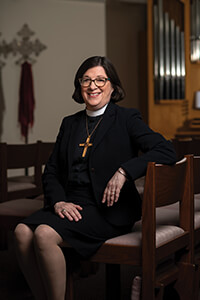Witnesses to the transcendent
June 5, 2020
An amazing thing happened in March. Churches were closed but more people came to church. Millions of us were complying with shelter-in-place and physical distancing recommendations from the Centers for Disease Control and Prevention (CDC), and state and local officials to stop the spread of the coronavirus. In a matter of days our lives were completely disrupted. The places where we sheltered became our offices, classrooms, day care centers and recreational facilities. Traffic dissipated—I was tempted to leave my house and drive unimpeded up and down the Kennedy Expressway just because it was possible.
Measures to slow the spread of the disease work against in-person gatherings. Coming together for worship wasn’t possible. Maintaining 6 feet of distance between people, refraining from touching and wearing face masks aren’t conducive to corporate worship. I was in a CDC briefing that pointed out that singing was right up there with sneezing and coughing in spreading the virus. Conventional all-together-in-the-building church was out.
So, what did we do? We found new ways of receiving the word and singing praise to God. All across this church, pastors and deacons, musicians and lay leaders created imaginative and fresh ways to worship. Virtual church, recorded church, livestreamed church happened everywhere. In parts of the country without sufficient Wi-Fi, congregations phoned each other, some on landlines. Pastors and deacons kept in contact with the people, and parishioners called each other. Worship resources to be used at home were shared. We might have been physically distanced, but we were not spiritually or socially isolated.
Many congregations and worship sites reported that online attendance was up and, in some cases, exceeded average Sunday in-person participation. People “attended” several services in a day. And we know that many attending online would never walk into one of our churches.
The problem comes when people confuse the sacred space with the Sacred.
Now, before we get too excited about this new evangelism tool, we need to consider factors that may have contributed to increased attendance—no sports, no Starbucks, limited travel, convenience. This won’t last forever. But the restrictions imposed by the pandemic have made it clear that people are searching for hope and meaning and love. The gospel, the good news, the reality of God’s unconditional love “poured into our hearts through the Holy Spirit that has been given to us” (Romans 5:5), is the message that people long to hear. It is life for the dying, water for the parched, food for the starving, liberty for the oppressed. God has entrusted this word, this evangelical word, to the church and has commissioned us to tell it.
People wonder what the post-COVID world and the post-COVID church will look like. No one, except God, knows for certain. Our experience with worshiping remotely has taught us at least two things: the word of God expressed in worship, lament and praise is not irrelevant. And people who find our congregations—the building and people—intimidating or off-putting also long to be part of a community that witnesses to the life we have in Jesus.
I am praying for the day when we gather again. I miss going to church. Church, including the buildings, are sacred spaces. Human beings are drawn to places where they have experienced the holy. Congregations—buildings and people—are witnesses to the transcendent.
The problem comes when people confuse the sacred space with the Sacred. We must take care that our congregations don’t become idols. Since we have concrete evidence that people who long to hear about the life, hope and grace that comes to the world through Jesus won’t come into our churches, we need to go to them. We have done this in creative ways and through online worship during the pandemic. Don’t stop. When we are able to return to our sacred spaces, let’s make an honest assessment of the ways that our congregations are witnesses to the transcendent, places where we are nourished for the journey and then sent out to serve. Or have they become barriers to those seeking the love and freedom God has given to all people in Christ?


